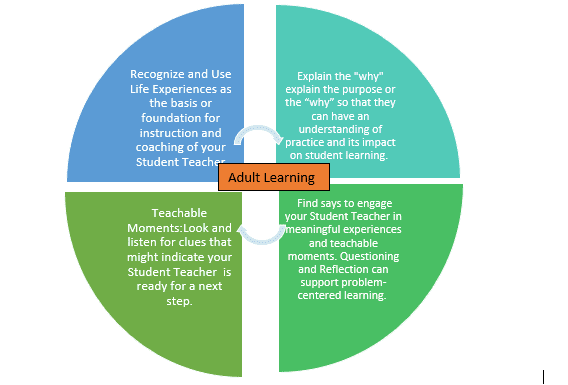Module 1 – Overview of YLI
Note: YLI is a title used to describe the Yearlong Intern during this semester whose title will change to Student Teacher next semester during full-time student teaching.
The most successful coaching and mentoring happens when the YLI and Clinical Educator have a solid relationship with good communication. Building great relationships begins each person’s mindset. Having a growth mindset supports the interactions between Clinical Educators and teacher candidates. Growth mindset is focused on improvement through the lens that talent, intelligence, and abilities can be developed through hard work, effort, grit, and perseverance. When you have a growth mindset you treat questions, challenges, failures, and other obstacles as opportunities to learn and grow. Watch the video below and think about how it relates to the journey you are about to take as a Clinical Educator.
As a Clinical Educator it’s imperative that you and your YLI have a growth mindset and learn about and from each other as the semester progresses. As an education professional and role model for the YLI , your willingness to be vulnerable and show how to adjust instruction, practices, and your mindset throughout the day is critical to helping our YLI understand the importance of growth mindset to the craft of teaching.

“The difference between a beginning teacher and an experienced one is that the beginning teacher asks, “How am I doing?” and the experienced teacher asks, How are the children doing?”
~Esme Raji Codell

Relationship Building
Part of the relationship building piece is communication. How a person communicates is often rooted in his/her personality and experience. We strongly encourage our Clinical Educators to have conversations with their YLIduring the initial clinical experiences about communication preferences, scheduled days of attendance, and any other general questions about teaching. This semester, your YLI will be in your classroom the equivalent of at least one day per week, so you should spend some time talking before or after-school, during teacher workdays, etc. to get to know each other and discuss things that are important to the overall student teaching experience. With that said, we recommend some relationship building activities. Here are some examples of ways you can do this:
- Ask questions about each other’s personal preferences for communication, ways to convey feedback, and pet peeves (we all have them!).
- Spend time together outside of school – i.e., going out for coffee or lunch.
- Create an all about me page to include any information you think is important about you, your communication styles, etc.
Take this online personality assessment. Discuss your results and how this information will help you as you work together during this yearlong internship
Role of CE
- Be a positive member of the school community and teaching profession.
- Provide daily coaching and feedback to the candidate. (The role of the CE is changing to include more coaching and mentoring of the candidate than a hands-off approach.)
- Attend required training and orientation provided by the Office of School & Community Partnerships and the Cato College of Education.
- Complete the required Confidentiality Agreement and maintain the confidentiality of the teacher candidate as outlined by the Family Educational Rights and Privacy Act (FERPA) 1974.
- Communicate regularly with your assigned Faculty Site Coordinator, YLI and the Office of School & Community Partnerships regarding the progress of your teacher candidate.
- Establish a plan of communication with your teacher candidate regarding his/her attendance, lesson planning expectations, parent communication, classroom and school procedures, and school and district rules and policies (This includes exchanging contact information and the method of preferred contact).
- Provide the teacher candidate with necessary materials for planning, data collection, and his/her role as a full-time teacher candidate (textbooks, schedules, class lists, seating charts, school & district handbooks, curriculum guides, and other important information).
- Establish expectations regarding implementation of school policies, management, drills (fire, tornado, and lock-down), classroom management, parents, and other pertinent community-related events or issues.
- Provide an area for the candidate to work, and introduce the candidate to the students and staff.
- Plan to conference with the teacher candidate at least once per week. Informal feedback through coaching and mentoring should occur daily.
- Plan lessons jointly at the beginning of the student teaching semester.
- As the candidate develops confidence with lesson planning and working with students, responsibilities for planning should increase.
- As the semester progresses, the teaching load should be gradually increased until the full load is attained.
- Utilize co-teaching strategies as the candidate assumes full-time responsibility for the class.
- As the semester ends, responsibilities should be decreased gradually. During the last week, candidates are required to assist in the classroom while observing other teachers.
- Work with the candidate and support staff concerning roles in the classroom (Teacher Assistants, English Language Learners, Exceptional Children).
- Evaluate the candidate formally during the semester using the CPAST (Candidate Preservice Assessment of Student Teaching). A formal conference should follow each observation. CPAST feedback should be submitted to the Faculty Site Coordinator a minimum of 2 – 3 days prior to the candidate’s observation.
- Make time to meet with the Faculty Site Coordinator during scheduled visits. Review scores and provide honest and constructive feedback to the candidate.
- Attend data meetings presented by the Faculty Site Coordinator.
- Inform the Faculty Site Coordinator or the Assistant Dean of School & Community Partnerships immediately when serious or continuous problems occur or there are persistent concerns with performance of a candidate.
- Share feedback of the candidate’s progress with the Faculty Site Coordinator throughout the semester and provide input into the final grade of student teaching.
- Complete all final documentation in a timely manner.
Clinical Educator Reminders
- The licensure process is separate from the supervision process. While student teaching is a component of licensure, it is only one component.
- If you have performance concerns, please contact the Faculty Site Coordinator and/or the Office of School & Community Partnerships so that adequate support can be implemented.
- Student performance and progress is bound by FERPA guidelines and should not be discussed with other members of school faculty and staff beyond the principal or administration designee and/or Lead CE.
- Each candidate brings his/her own perspective, teaching, management style, and background. It is critical to take time at the beginning of the internship to get to know one another’s backgrounds, educational philosophies, expectations, and non-negotiables.
- Culturally responsive/sustaining pedagogies have been taught throughout most of our programs. Our candidates have an understanding of pedagogies and best practices that support students of all backgrounds and abilities. Often they are faced with challenges when their understanding of culturally responsive teaching does not align with the practices that they observe in their internship setting. It is important to have conversations about what they have been taught, believe, and observe and how those might be in conflict.
Your YLI will begin his/her classroom experiences in your classroom, and we want to prepare them well for their student teaching semester. Having students take a part in the classroom and supporting them with in-the-moment coaching will help with growth towards their goals.
Expectations of Teacher Candidates
- Review the Student Teaching Internship Handbook & Checklist with the Clinical Educator.
- Identify, agree upon, and schedule key activities.
- The YLI should exchange his/her contact information with key school personnel (i.e., Clinical Educator, school placement contact, school safety contacts, etc.).
- Spend a minimum of the equivalent of one day per week in the classroom.
- Complete YLI logs and communicate with assigned OSCP contact.
- Notify the Clinical Educator immediately of attendance changes or late arrivals.
- Complete Field Experience Checklist and secure CE’s signatures.
- Complete Attendance Log and secure signatures.
- Secure approval before completing instructional activities.
- Maintain confidentiality.
- Dress professionally, seek feedback, and grow personally and professionally.
As a reminder, students are taking a full load of classes for both their major and minor during the YLI semester.
YLIs should plan-out when they intend to teach small and whole group class lessons. As mentioned previously, your YLI teacher candidate is required to complete a checklist of activities that you will sign to help orient them to your classroom, build relationships with the students, and get comfortable with teaching expectations. They should share this checklist with you early in the semester, and you should discuss with them how to address items on the checklist.
In some cases, students may have additional assignments required for their major or minor classes unrelated to the checklist. In such cases, they should communicate with you about the assignments.
Working with an adult learner

There are four things to keep in mind when working with adult learners.
- Adults need to be involved in the planning and evaluation of their instruction.
- Explain the “Why.” When giving advice, coaching, or having a conversation with your YLI about best practices, explain the purpose or the “why” so that they can have an understanding of practice and its impact on student learning.
- Experience (including mistakes) provides the basis for the learning activities.
- Recognize and use life experiences as the basis or foundation for instruction and coaching of your YLI
- Adults are most interested in learning subjects that have immediate relevance and impact to their job or personal life.
- Teachable Moments: Look and listen for clues that might indicate your YLI is ready for a next step.
- Adult learning is problem-centered rather than content-oriented. (Kearsley, 2010)
- Young learners learn sequentially, but adults tend to start with a problem and then work to find a solution. Find ways to engage your YLI in meaningful experiences and teachable moments. Questioning and reflection can support problem-centered learning.